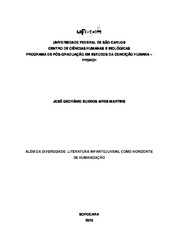| dc.contributor.author | Martins, José Geovânio Buenos Aires | |
| dc.date.accessioned | 2023-04-20T12:15:58Z | |
| dc.date.available | 2023-04-20T12:15:58Z | |
| dc.date.issued | 2023-02-24 | |
| dc.identifier.citation | MARTINS, José Geovânio Buenos Aires. Além da diversidade: literatura infantojuvenil como horizonte de humanização. 2023. Dissertação (Mestrado em Estudos da Condição Humana) – Universidade Federal de São Carlos, Sorocaba, 2023. Disponível em: https://repositorio.ufscar.br/handle/ufscar/17824. | * |
| dc.identifier.uri | https://repositorio.ufscar.br/handle/ufscar/17824 | |
| dc.description.abstract | As of Flor and Rosa: a love story between equals (2011), The Love does not choose sex (2010), The boy who played at being (2000) and Olívia has two daddies (2010), tried to be investigate the constructed didacticism by literary narratives, bringing to the discourse the process of humanization promoted through literature explained by Antonio Candido (2004), dealing mainly with the speeches of the characters, which implies, for example, discussing sexual orientation and gender identity , to recognize the interface between literature and society. In this way, it is possible to observe a series of stereotypes and didactic counterpoints of the corpus analyzed from the speeches of the characters, since there is a denunciation of violence against the LGBT population. This is a bibliographical review that takes into account gender studies and literary criticism, applying the interpretive method of Fabio Akcelrud Durão (2020). The interpretation starts from the speeches of the characters, taking into account their association with typical stereotypes of LGBT social discrimination, in an attempt to discuss the didacticism of literary works. Based on these elements, the dissertation shows how literary narratives, implicitly and explicitly, seek to present the LGBT theme in a positive way. | eng |
| dc.description.sponsorship | Coordenação de Aperfeiçoamento de Pessoal de Nível Superior (CAPES) | por |
| dc.language.iso | por | por |
| dc.publisher | Universidade Federal de São Carlos | por |
| dc.rights | Attribution-NonCommercial-NoDerivs 3.0 Brazil | * |
| dc.rights.uri | http://creativecommons.org/licenses/by-nc-nd/3.0/br/ | * |
| dc.subject | Orientação sexual | por |
| dc.subject | Identidade de gênero | por |
| dc.subject | Didatismo | por |
| dc.subject | Humanização | por |
| dc.subject | Literatura infantojuvenil brasileira | por |
| dc.subject | Sexual orientation | eng |
| dc.subject | Gender identity | eng |
| dc.subject | Didacticism | eng |
| dc.subject | Humanization | eng |
| dc.subject | Brazilian children's juvenile literature | eng |
| dc.title | Além da diversidade: literatura infantojuvenil como horizonte de humanização | por |
| dc.title.alternative | Beyond of the diversity: literature infantjuvenile how horizon of humanization | eng |
| dc.type | Dissertação | por |
| dc.contributor.advisor1 | Gatti, Márcio Antônio | |
| dc.contributor.advisor1Lattes | http://lattes.cnpq.br/0369563657842763 | por |
| dc.description.resumo | A partir de Flor e Rosa: uma história de amor entre iguais (2011), O Amor não escolhe sexo (2010), O menino que brincava de ser (2000) e Olívia tem dois papais (2010), procurou ser investigado o didatismo construído pelas narrativas literárias, trazendo-se para o discurso o processo de humanização promovido por meio da literatura explicitado por Antonio Candido (2004), ocupando-se sobretudo das falas das personagens, o que implica, por exemplo, discutir orientação sexual e identidade de gênero, para reconhecer a interface literatura e sociedade. Dessa forma, é possível observar uma série de estereótipos e contrapontos didáticos do corpus analisado a partir das falas das personagens, uma vez que existe uma denúncia da violência contra a população LGBT. Trata-se de uma revisão bibliográfica que leva em consideração os estudos de gênero e a crítica literária, sendo aplicado o método interpretativo de Fabio Akcelrud Durão (2020). A interpretação parte das falas das personagens, levando em consideração sua associação com os estereótipos típicos da discriminação social LGBT, na tentativa de discutir o didatismo das obras literárias. Partindo desses elementos, a dissertação mostra como as narrativas literárias, de maneira implícita e explícita, buscam apresentar de maneira positiva o tema LGBT. | por |
| dc.publisher.initials | UFSCar | por |
| dc.publisher.program | Programa de Pós-Graduação em Estudos da Condição Humana - PPGECH-So | por |
| dc.subject.cnpq | CIENCIAS HUMANAS | por |
| dc.subject.cnpq | LINGUISTICA, LETRAS E ARTES::LETRAS::LITERATURA BRASILEIRA | por |
| dc.subject.cnpq | LINGUISTICA, LETRAS E ARTES::LETRAS::TEORIA LITERARIA | por |
| dc.description.sponsorshipId | Processo n. 88887.666898/2022-00 | por |
| dc.publisher.address | Câmpus Sorocaba | por |
| dc.contributor.authorlattes | http://lattes.cnpq.br/0140858987121365 | por |

